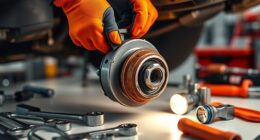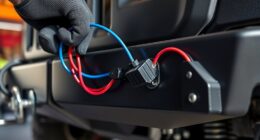Tuning your Toyota Prius can greatly enhance its efficiency and performance. Start by upgrading components like the electric motor and battery for better acceleration. Eco Mode helps optimize fuel consumption, while maintaining proper tire pressure can boost your MPG. Consider aftermarket parts and modifications for improved responsiveness, and explore handling upgrades to enhance your driving experience. While supercharging and turbocharging present challenges, engaging with online communities can provide invaluable insights. By strategically modifying your Prius, you'll find a balance between power and efficiency. There's plenty more to discover about maximizing your hybrid's capabilities.
Key Takeaways
- Upgrading the electric motor and battery can significantly enhance acceleration and overall performance in a Toyota Prius.
- Engine swaps, such as the 2ZZ from Matrix XRS, offer substantial power increases compared to standard configurations.
- Implementing aftermarket modifications like air intakes and ECU remapping can improve engine efficiency and responsiveness.
- Suspension upgrades, including coilovers and sway bars, enhance handling and reduce body roll for a sportier driving experience.
- Selecting low rolling resistance tires and maintaining proper tire pressure are essential for optimizing fuel efficiency and maximizing MPG.
Tuning Potential and Limitations
When it comes to tuning the Toyota Prius, you'll quickly discover both potential and limitations that can shape your approach. The tuning potential of the Prius is often overshadowed by its hybrid management systems and ECU constraints. Aiming for 200-300 whp may sound appealing, but you're likely to face significant challenges.
The Prius's ECU is designed to operate within specific parameters, making it tough to implement effective turbocharging or supercharging. Many attempts over the past 18 years have shown limited success, highlighting the difficulty in achieving substantial performance gains without extensive engineering.
If you want to add 160 hp to the 4-cylinder engine, you'll need to take into account the safe upper limits of the drivetrain. After all, increasing power could push components like the transmission and motor generator beyond their capabilities.
To truly tap into the tuning potential of your Prius, you often have to invest in aftermarket parts and modifications. This helps optimize the balance between the electric and gas components while maintaining reliability and performance.
Modifications and Engine Swaps
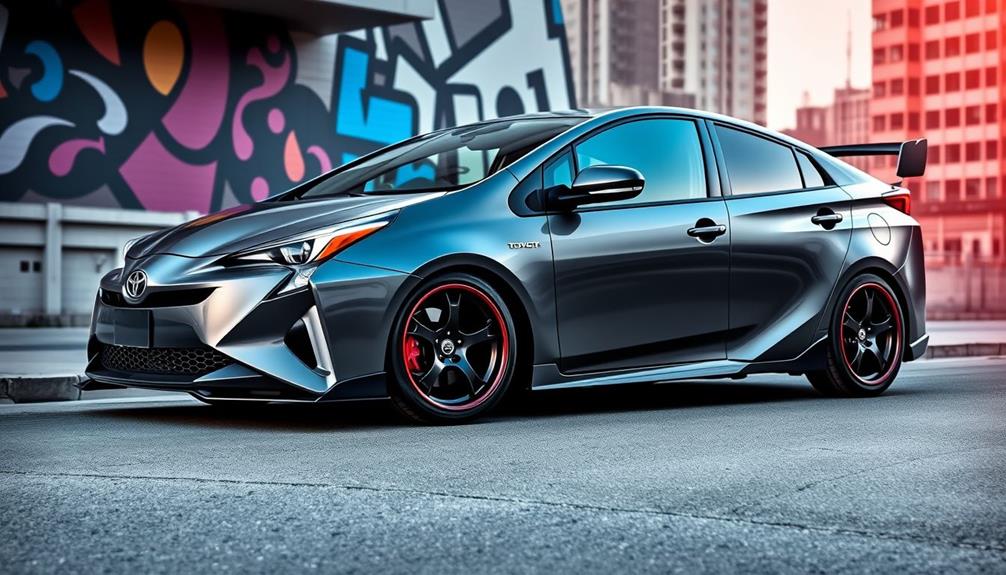
For those looking to enhance the performance of their Toyota Prius, modifications and engine swaps can provide viable paths to achieving greater power. However, tuning a Prius isn't straightforward due to its hybrid management systems, which complicate power modifications and require specialized expertise.
One popular option is swapping the stock engine with a complete 2ZZ engine from a Matrix XRS. This swap can lead to significant power increases, but be prepared for additional rebuilding efforts.
You might also consider aftermarket parts like red bullet VVTI solenoids and alternative camshafts from vehicles like the Corolla, though keep in mind that compatibility and performance gains can vary widely.
Focusing on drivetrain modifications is vital, as optimizing the electric motor and battery pack can dramatically improve acceleration and overall output.
Many enthusiasts discuss the limited success of performance enhancements in Priuses over the years, highlighting the complexities involved in hybrid tuning and modifications.
While there's potential for improvement, it's important to approach these upgrades with a clear understanding of the challenges you'll face in maximizing your Prius's performance.
Technical and Engineering Challenges
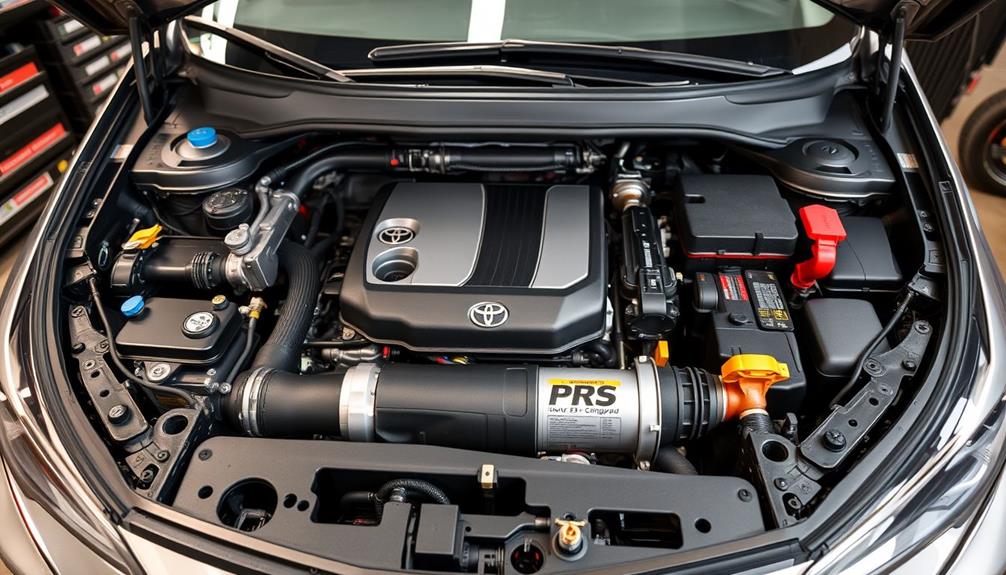
Tuning a Toyota Prius presents unique technical and engineering challenges that can frustrate even seasoned enthusiasts. The hybrid system's design, particularly its traction control, restricts power delivery, making it tough to boost performance without extensive modifications. For those looking to enhance the Prius’ performance, unlocking supercar performance may seem like an impossible feat. However, with the right expertise and resources, it is possible to overcome these challenges and significantly improve the car’s acceleration, handling, and overall driving experience. This often involves reprogramming the hybrid system, upgrading the traction control, and installing aftermarket performance parts to unleash the full potential of the vehicle.
You'll quickly find that the stock transmission and motor generator aren't built to handle significant horsepower increases, which risks damaging these components under higher power conditions.
When you try to enhance the Prius's power, you face engineering hurdles in maintaining the delicate balance between the electric and gas components of the hybrid system. This balance is essential, as any misstep could lead to inefficiencies or system failures.
If you're considering forced induction methods like turbocharging or supercharging, be prepared for serious ECU limitations. The factory ECU isn't designed to adapt to these changes without extensive reprogramming, complicating your tuning efforts.
Given these technical and engineering challenges, many enthusiasts might opt for engine swaps, such as the complex K-swap. This route can sometimes provide a more straightforward path to achieving the performance enhancements you desire, sidestepping many of the limitations inherent in the Prius's hybrid setup.
Supercharging and Turbocharging Insights
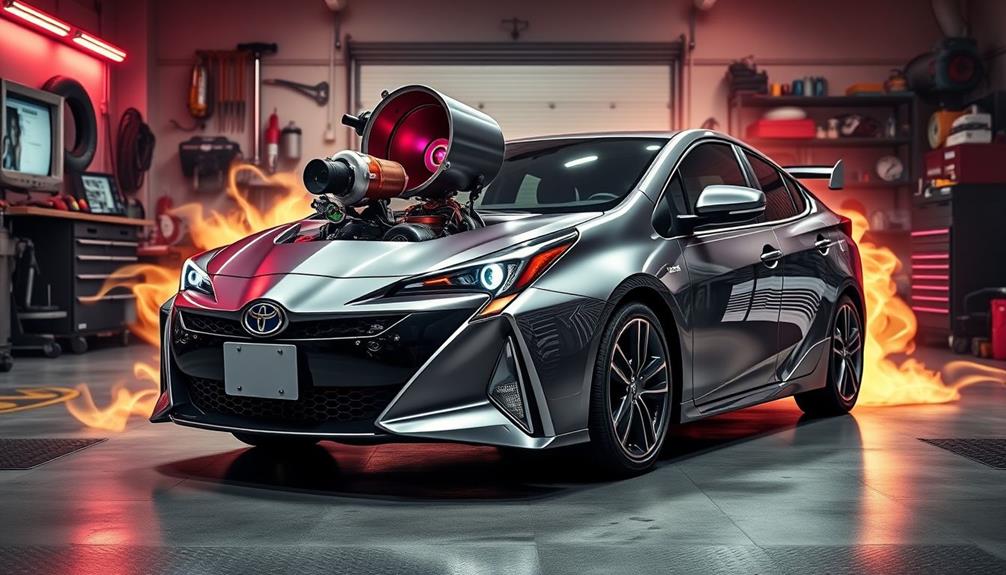
In recent years, enthusiasts have increasingly turned to supercharging and turbocharging as potential methods to enhance the performance of the Toyota Prius. While supercharging can provide that thrilling boost, it comes with significant engineering challenges due to the hybrid system's unique design.
Here are three key insights to contemplate:
- Modification Requirements: Supercharging a Prius often requires extensive modifications, which can lead to headaches during installation and calibration.
- Horsepower Consumption: Superchargers consume considerable horsepower from the engine. If not calibrated properly, this can negatively impact the overall performance, leaving you with a supercharged vehicle that doesn't deliver the expected gains.
- Turbo Lag: Turbocharging offers potential performance benefits by utilizing exhaust gases. However, it introduces turbo lag, complicating power delivery in hybrid systems, which can hinder your driving experience.
Both supercharging and turbocharging may face limitations with the Prius's ECU, designed for factory power settings. This complicates modifications and makes predicting outcomes challenging.
Community Insights and Discussions

Often, Prius enthusiasts turn to the PriusChat community for valuable insights and shared experiences on hybrid tuning and performance modifications. Since its inception in 2003, this platform has become a hub for discussions about the feasibility and challenges of tuning a Prius.
You'll find members sharing both their successes and failures, which can help you navigate your own tuning journey.
One recurring theme in these discussions is the complexity of modifying a hybrid system. Many members highlight that upgrading power while maintaining fuel efficiency can be tricky, requiring specialized knowledge.
You might also come across humorous exchanges where participants jokingly suggest that buying a different vehicle could be a more effective route for performance enthusiasts.
Despite these challenges, there's a shared acknowledgment within the community of Toyota's balanced approach to performance in the Prius. Many members appreciate that the focus remains on fuel efficiency rather than extensive re-engineering.
This understanding shapes your tuning aspirations, as you learn to maximize your Prius's potential while staying true to its hybrid roots. Engaging with this vibrant community can offer you insights that are invaluable for your tuning endeavors.
Performance Enhancements
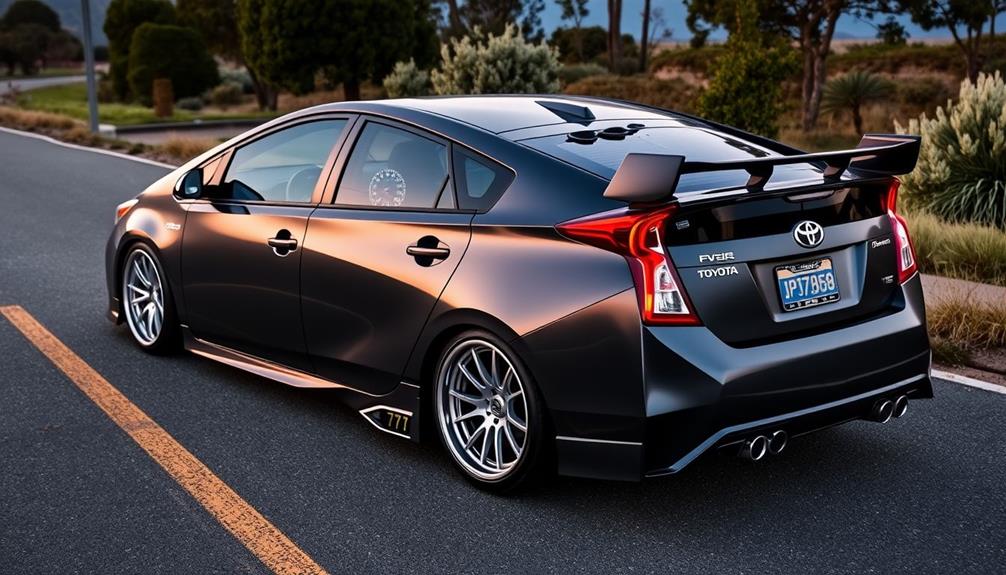
Engaging with the PriusChat community not only provides valuable insights but also sparks interest in performance enhancements for your Prius.
As technology evolves, much like the demand for AI Ethicist Jobs, exploring innovative performance upgrades is essential for staying ahead.
If you're looking to boost your hybrid's capabilities, consider these effective upgrades:
- Drivetrain Enhancement: Upgrading your electric motor and battery can greatly enhance acceleration. Focus on high-performance motors and aftermarket battery packs to get that extra push when you need it.
- ECU Remapping: Tuning your ECU is essential for peak performance. It adjusts engine parameters, improving responsiveness and allowing for better integration of hybrid components. This can result in a more enjoyable driving experience.
- Air Intake Modifications: Enhancing your air intake system can lead to better engine responsiveness and efficiency. A well-tuned intake makes your Prius not just more efficient but also more fun to drive.
Traction and Handling Improvements
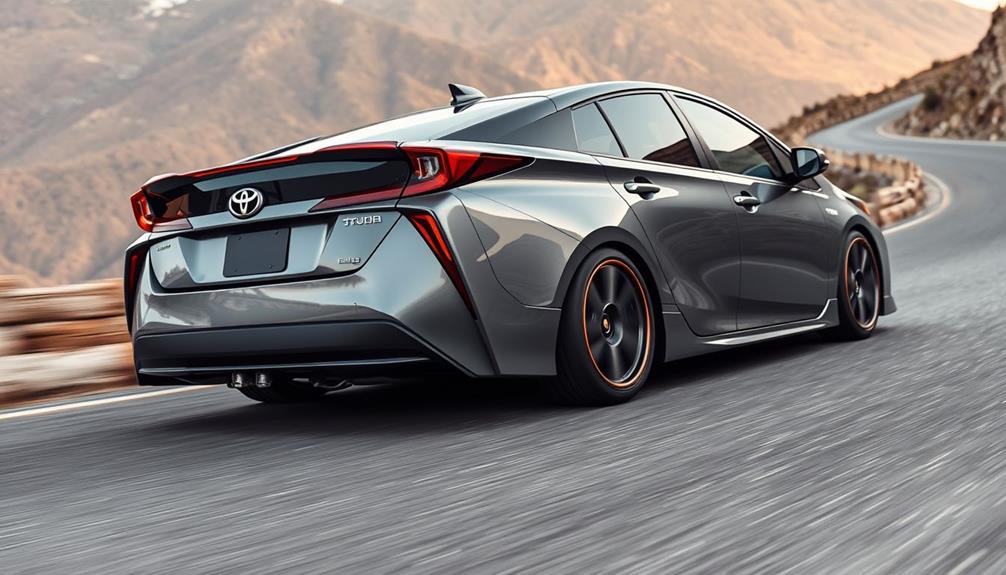
To truly transform your Prius into a nimble and responsive vehicle, investing in traction and handling improvements is key. Upgrading your suspension system with sporty components like coilovers and sway bars can greatly enhance handling and reduce body roll during turns. This results in improved cornering performance, making every drive more enjoyable.
Installing strut tower bars boosts chassis rigidity, which enhances steering response and gives you greater confidence during aggressive maneuvers. If you're looking for even better grip, consider an all-wheel drive (AWD) model. The additional electric motor for the rear wheels helps maintain traction on slippery surfaces while still prioritizing efficiency.
Aerodynamic improvements, such as front air dams and side skirts, can also play a vital role. They reduce drag and increase stability at higher speeds, contributing to better handling dynamics.
Remember, the proper setup of your upgraded suspension components is essential. It maximizes performance and boosts your driving confidence, allowing for a more engaging experience whether you're steering through city streets or winding country roads.
With these traction and handling improvements, your Prius can feel more like a sports car while still enjoying the benefits of hybrid technology.
Fuel Efficiency Optimization
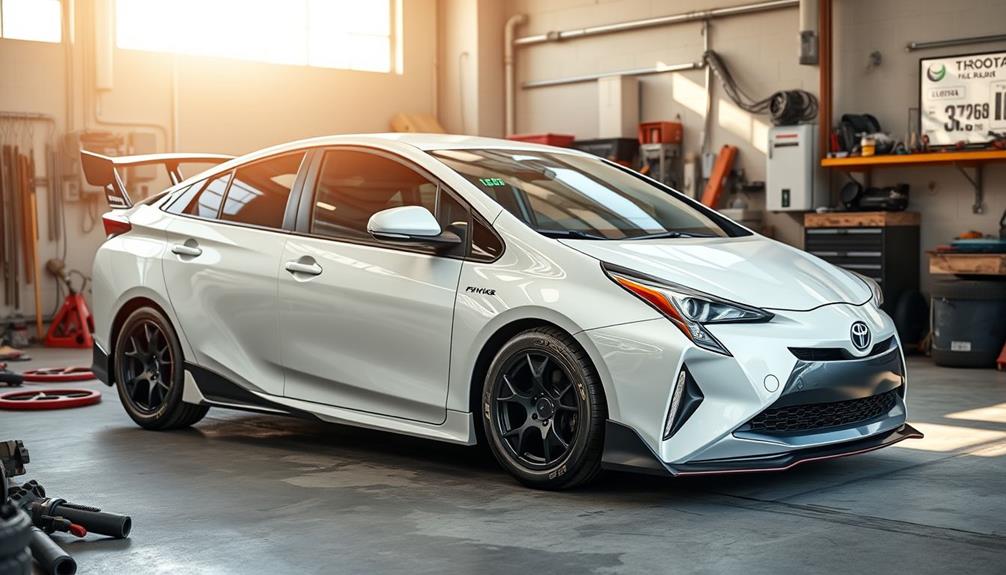
To maximize your Prius's fuel efficiency, focus on your driving habits, tire selection, and regular maintenance.
Gentle acceleration and coasting can boost your MPG, while choosing the right all-season tires will minimize rolling resistance.
Plus, keeping up with maintenance guarantees your vehicle runs smoothly and efficiently, helping you get the most out of every gallon.
Driving Habits Impact
Driving a Toyota Prius isn't just about having an eco-friendly vehicle; it's also about how you drive it. Your driving habits can greatly influence the efficiency of your hybrid, leveraging its drivetrain capabilities for ideal performance.
Here are three key habits to adopt:
- Smooth Acceleration and Braking: Gentle acceleration and gradual braking can boost your fuel efficiency, often resulting in an impressive 50-53 MPG.
- Maintain a Steady Speed: Use coasting techniques and keep an eye on the energy monitor to identify ideal speed ranges. This helps conserve energy and enhances your driving experience.
- Engage Eco Mode: Activating Eco Mode adjusts the throttle response and climate settings, promoting energy conservation and improving overall fuel economy.
Tire Selection Importance
Your choice of tires can have a significant impact on the fuel efficiency of your Toyota Prius, complementing the smart driving habits you've adopted.
Selecting the right all-season tires, like the Michelin Energy Saver A/S and Bridgestone Ecopia EP422 Plus, can enhance fuel efficiency without sacrificing traction. These tires are designed with lower rolling resistance, meaning they require less energy to roll, which directly improves your fuel consumption.
Tire pressure plays a vital role in this equation. According to the U.S. Department of Energy, maintaining ideal tire pressure can boost your gas mileage by up to 3%. Regularly checking your tire pressure guarantees that your tires perform efficiently.
Additionally, lightweight tires can reduce your vehicle's weight, contributing to better handling and enhanced overall driving dynamics.
Don't forget about tire tread depth. It's recommended to replace tires when tread wears down to 2/32 of an inch to guarantee peak performance and safety.
Maintenance for Efficiency
Maintaining your Toyota Prius is essential for maximizing fuel efficiency and ensuring a smooth driving experience. By focusing on key areas of maintenance for efficiency, you can enhance your vehicle's performance and save on fuel costs.
Here are three important maintenance tips:
1. Tire Pressure: Keep your tires properly inflated to avoid decreased fuel efficiency. Under-inflated tires can lead to higher fuel consumption.
Consider high-efficiency tires like Michelin Energy Saver A/S or Bridgestone Ecopia EP422 Plus for best performance.
2. Regular Engine Maintenance: Schedule routine oil changes and air filter replacements. This keeps your engine running smoothly, helping you achieve an average fuel consumption of 50-53 MPG.
3. Driving Habits: Embrace smooth driving techniques, like minimizing rapid acceleration and using regenerative braking.
This not only improves fuel efficiency but can also allow you to travel up to 460 miles on a single tank.
Interior Comfort and Aesthetics
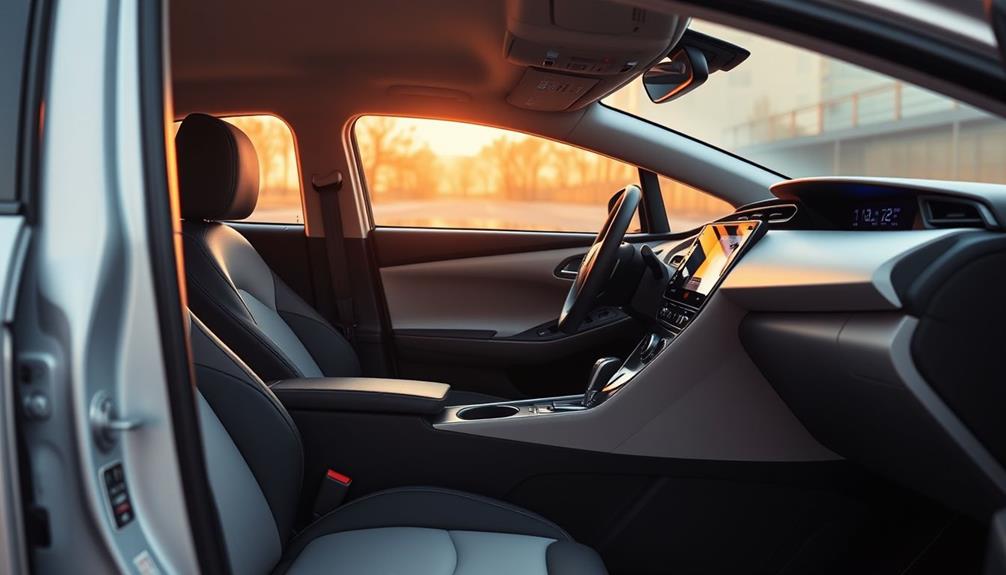
Transforming the interior of a Toyota Prius can greatly enhance both comfort and aesthetics, making every drive more enjoyable. Upgrading to high-quality premium leather seats provides a luxurious feel while guaranteeing support during your longer journeys.
You'll appreciate the added comfort as you navigate through city traffic or commence on road trips.
Installing a high-quality sound system can elevate your audio experience, making it a joy for you and your passengers to enjoy music or podcasts. Custom ambient LED lights add a unique touch, allowing you to personalize the lighting to match your mood or style.
Don't overlook the benefits of seat warmers and upgraded climate control systems, which guarantee you stay comfortable regardless of the weather outside.
Alongside these interior upgrades, consider adding aftermarket body kits and stylish alloy wheels. Not only do they enhance your Prius's visual appeal, but they can also improve aerodynamics and reduce weight.
Frequently Asked Questions
How Can I Make My Prius More Efficient?
To make your Prius more efficient, keep tire pressure at 35 PSI, perform regular maintenance, drive in Eco Mode, choose high-quality tires, and practice smooth driving habits for better fuel economy and performance.
How to Improve Prius Performance?
To improve your Prius performance, consider remapping the ECU, upgrading to lightweight components, and installing high-performance brake rotors. Regular maintenance and using efficient tires also boost handling and fuel efficiency effectively.
How Can I Boost My Prius Hybrid?
To boost your Prius hybrid, consider upgrading components like the electric motor and battery, remapping the ECU, reducing weight with lightweight materials, enhancing the drivetrain and suspension, and maintaining proper tire pressure for maximum efficiency.
What Speed Is Prius Most Efficient?
Think of your Prius as a delicate dance partner; it thrives between 30 to 45 mph. At this speed, it gracefully balances electric power and engine efficiency, maximizing fuel economy while keeping your journey smooth.
Conclusion
Tuning your Toyota Prius can be like revealing a treasure chest of efficiency and performance. By exploring modifications, optimizing fuel usage, and enhancing handling, you can transform your hybrid into a more enjoyable ride without sacrificing its eco-friendly charm. Don't shy away from community discussions; they're a goldmine for tips and tricks. With the right approach, you can truly maximize your Prius's potential, making every drive a smoother, more exhilarating experience. Happy tuning!







